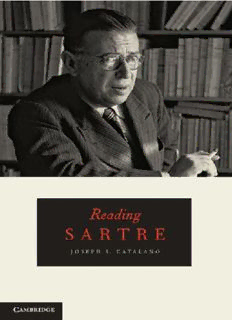
Reading Sartre PDF
Preview Reading Sartre
Reading Sartre In this volume, Joseph S. Catalano offers an in-depth explora tion of Jean-Paul Sartre's four major philosophical writings: Being and Nothingness, Saint Genet: Actor and Martyr, The Critique of Dialectical Reason, and The Family Idiot. These works have been immensely influential, but they are long and difficult and thus chal lenging for both students and scholars. Catalano here demonstrates the interrelation of these four works, their internal logic, and how they provide insights into important but overlooked aspects of Sartre's thought, such as the body, childhood, and evil. The book begins with Sartre's final work, The Family Idiot, and systematically works backward to Being and Nothingness. Catalano then repeats the study by advancing chronologically, beginning with Being and Nothingness and ending with The Family Idiot and an afterword on Gustave Flaubert's Madame Bovary. Readers will appreciate Catalano's subtle readings as well as the new insights that he brings to Sartre's oeuvre. Joseph S. Catalano is Professor Emeritus at Kean University of New Jersey and a former Adjunct Professor of Philosophy at the New School University for Social Research. He is the author of A Commentary of Jean-Paul Sartre's "Being and Nothingness"; A Commentary on Jean-Paul Sartre's "Critique of Dialectical Reason"; Good Faith and Other Essays: Perspectives on a Sartrean Ethics; and Thinking Matter: Consciousness from Aristotle to Putnam and Sartre. Reading Sartre JOSEPH S. CATALANO Professor Emertius at Kean University, New Jersey HI CAMBRIDGE ^0 UNIVERSITY PRESS CAMBRIDGE UNIVERSITY PRESS Cambridge, New York, Melbourne, Madrid, Cape Town, Singapore, Sao Paulo, Delhi, Dubai, Tokyo, Mexico City Cambridge University Press 32 Avenue of the Americas, New York, NY 10013-2473, USA www.cambridge.org Information on this title: www.cambridge.org/9780521152273 © Joseph S. Catalano 2010 This publication is in copyright. Subject to statutory exception and to the provisions of relevant collective licensing agreements, no reproduction of any part may take place without the written permission of Cambridge University Press. First published 2010 Printed in the United States of America A catalog record for this publication is available from the British Library. Library of Congress Cataloging in Publication data Catalano, Joseph S. Reading Sartre / Joseph S. Catalano. p. cm. Includes bibliographical references and index. ISBN 978-0-521-76646-3 (hardback) 1. Sartre, Jean-Paul, 1905-1980. I. Title. B2430.S34C346 2010 i94-dc22 2010014790 ISBN 978-0-521-76646-3 Hardback ISBN 978-0-521-15227-3 Paperback Cambridge University Press has no responsibility for the persistence or accuracy of URLS for external or third-party Internet Web sites referred to in this publication and does not guarantee that any content on such Web sites is, or will remain, accurate or appropriate. For Marisa I have tried to do the following: To indicate the limit of psychoana lytical interpretation and Marxist explanation and to demonstrate that freedom alone can account for a person in his totality. Jean-Paul Sartre, Saint Genet: Actor and Martyr Contents Preface page ix Acknowledgments xiii Works Frequently Cited xv PART ONE: A RETROSPECTIVE OVERVIEW I The Family Idiot 3 2 Saint Genet: Actor and Martyr 21 3 The Critique of Dialectical Reason 43 4 Being and Nothingness 69 PART TWO: THE WORKS THEMSELVES 5 Being and Nothingness 91 6 The Critique of Dialectical Reason 113 7 Saint Genet: Actor and Martyr 137 8 The Family Idiot: Part One - Constitution 162 9 The Family Idiot: Concluded 182 Afterword: Madame Bovary 201 Index 207 Vll Preface About forty years ago, I was introduced to Jean-Paul Sartre's thought as a pure accident of a teaching career in philosophy. For reasons that are too complicated to mention here, the late Dean Ruben Abel of the New School for Social Research in Manhattan asked me to teach a series of courses in Existentialism. Neither my undergraduate nor graduate training in philoso phy prepared me for the subject matter; but the challenge came at a time in my life when I was looking for a change. I found it. But I did not know at first that I would keep returning to the philosophy of Jean-Paul Sartre, particu larly to the four works I consider here, namely, Being and Nothingness, Saint Genet: Actor and Martyr, The Critique of Dialectical Reason, and The Family Idiot. I offer no excuse. These works continue to nourish my own thinking about the world. One might nevertheless ask whether my personal interest in Sartre justi fies another book about his thought. I could answer that these four works give the substance of Sartre's philosophy as it developed from his first essay on the imagination published in 1936 until the appearance of the last volume of The Family Idiot in 1972, and that I do not think many people have had either the leisure or the commitment to study these long and difficult books. Perhaps, then, it is sufficient to say that I simply wish to share the fruits of my labor. Because I am mainly concerned with presenting my understanding of Sartre's thought, it is appropriate for me to admit that this text is not a critique in the usual sense of that word. I seek understanding rather than criticism. On the other hand, I would not have spent so much of my life reading and thinking about Sartre's thought if I did not think that it is, for the most part, true. This truth, however, is not something closed; it is itself an invitation. You may wish to read more deeply about Sartre yourself, and even in these brief reflections, you may discover that Sartre can help you, as he has helped me, understand more fully our place in this strange and wonderful world in which we live. IX
Description: